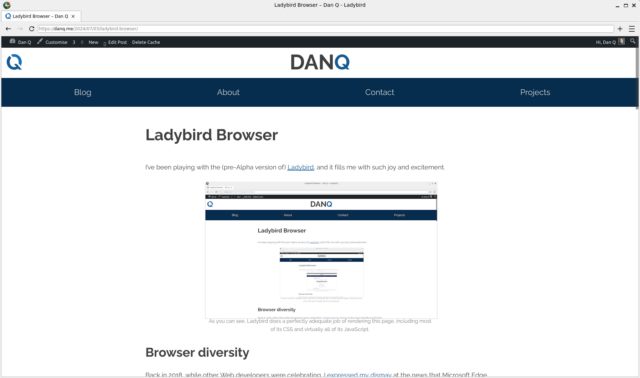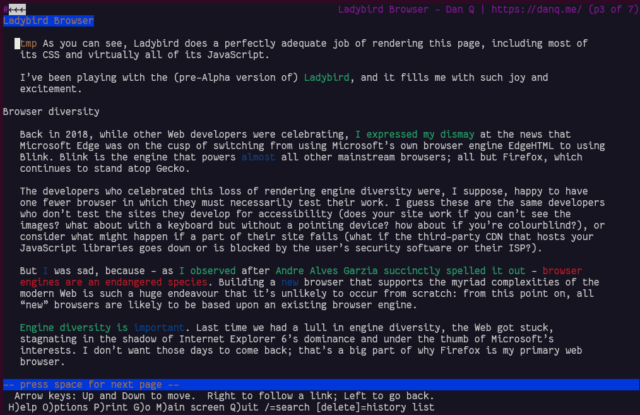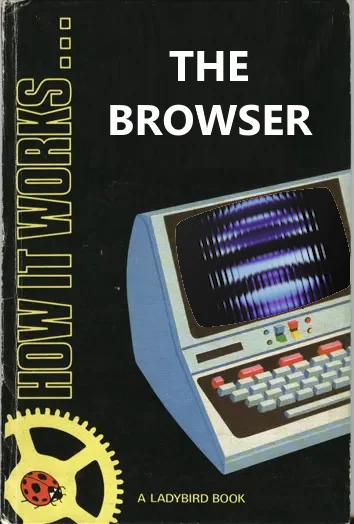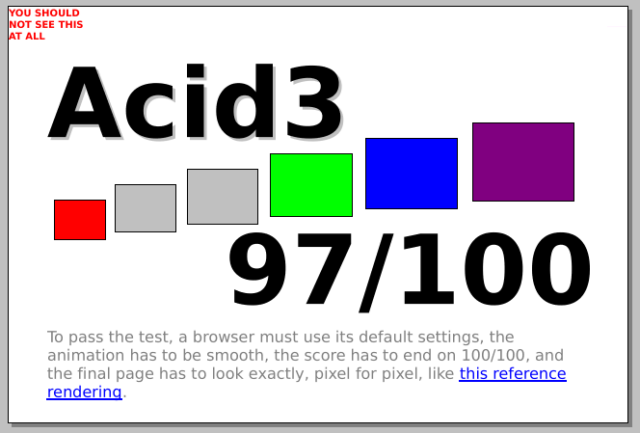I’ve been playing with the (pre-Alpha version of) Ladybird, and it fills me with such joy and excitement.

Browser diversity
Back in 2018, while other Web developers were celebrating, I expressed my dismay at the news that Microsoft Edge was on the cusp of switching from using Microsoft’s own browser engine EdgeHTML to using Blink. Blink is the engine that powers almost all other mainstream browsers; all but Firefox, which continues to stand atop Gecko.
The developers who celebrated this loss of rendering engine diversity were, I suppose, happy to have one fewer browser in which they must necessarily test their work. I guess these are the same developers who don’t test the sites they develop for accessibility (does your site work if you can’t see the images? what about with a keyboard but without a pointing device? how about if you’re colourblind?), or consider what might happen if a part of their site fails (what if the third-party CDN that hosts your JavaScript libraries goes down or is blocked by the user’s security software or their ISP?).

But I was sad, because – as I observed after Andre Alves Garzia succinctly spelled it out – browser engines are an endangered species. Building a new browser that supports the myriad complexities of the modern Web is such a huge endeavour that it’s unlikely to occur from scratch: from this point on, all “new” browsers are likely to be based upon an existing browser engine.
Engine diversity is important. Last time we had a lull in engine diversity, the Web got stuck, stagnating in the shadow of Internet Explorer 6’s dominance and under the thumb of Microsoft’s interests. I don’t want those days to come back; that’s a big part of why Firefox is my primary web browser.
A Ladybird book browser

Ladybird is a genuine new browser engine. Y’know, that thing I said that we might never see happen again! So how’ve they made it happen?
It helps that it’s not quite starting from scratch. It’s starting point is the HTML viewer component from SerenityOS. And… it’s pretty good. It’s DOM processing’s solid, it seems to support enough JavaScript and CSS that the modern Web is usable, even if it’s not beautiful 100% of the time.

They’re not even expecting to make an Alpha release until next year! Right now if you want to use it at all, you’re going to need to compile the code for yourself and fight with a plethora of bugs, but it works and that, all by itself, is really exciting.
They’ve got four full-time engineers, funded off donations, with three more expected to join, plus a stack of volunteer contributors on Github. I’ve raised my first issue against the repo; sadly my C++ probably isn’t strong enough to be able to help more-directly, even if I somehow did have enough free time, which I don’t. But I’ll be watching-from-afar this wonderful, ambitious, and ideologically-sound initiative.
#100DaysToOffload
Woop! This is my 100th post of the year (stats), even using my more-conservative/pedant-friendly “don’t count checkins/reposts/etc. rule. If you’re not a pedant, I achieved #100DaysToOffload when I found a geocache alongside Regents Canal while changing trains to go to Amsterdam where I played games with my new work team, looked at windows and learned about how they’ve been taxed, and got nerdsniped by a bus depot. In any case: whether you’re a pedant or not you’ve got to agree I’ve achieved it now!